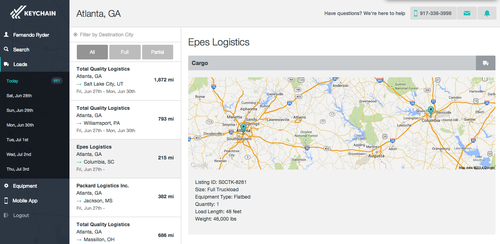Freight brokering is going online. Here’s why.
This guest post is written by Keychain Logistics. Keychain Logistics is a leading transportation provider enabling businesses to directly engage carriers, track shipments, and monitor its logistics needs online.
It’s 2012. Platforms like Uber, Airbnb, and Homejoy are growing rapidly. New customers are signing up via search, paid referrals, and social media. Marketing teams at each are delicately balancing the supply and demand of their output with a spread of calculations that, if not projected carefully, may lead to service outages and upset customers.
Now what’s going on here, and what does this have to do with logistics?
The companies above, alongside many others eating the world today with software, are all marketplaces.
Speaking in online terms, a marketplace is where buyers and sellers of a particular product or service can collaborate in a streamlined process to achieve what they want from the other side.
In exchange for facilitating relationships, thus saving time and resources for the entities wanting to connect, marketplaces may charge subscription fees, transaction commissions, or depend simply on high traffic volume to sell other assets like media space or proprietary content.
But facilitating relationships is only a necessary component, and not a sufficient one, to the success of a marketplace. This is because some buyers and sellers feel that the benefit of a marketplace has been fully realized upon their connection, and thus don’t stick around for the platform to send a bill.
What marketplaces must do to maintain engaged users, then, is create experiences inside the application that remove the incentive to circumvent it. And this is a tough challenge to solve.
One great example of this is Odesk.com, a marketplace connecting freelancers with employers who have projects to outsource. In exchange for this service, Odesk charges a 10% fee to employers per transaction. While this may sound steep, Odesk meets this ask with a suite of free management tools such as random monitor screenshots that let employers track the productivity of an outsourced team member without worrying about being overbilled on hours.
For freelancers, Odesk requires employers to place valid credit cards on file pre-hire, protecting them from employers who might otherwise attempt to avoid a payment. Tools like this make the Odesk platform (and its fees) worth every penny, thus creating a winning marketplace that helps both sides get what they deserve.
That said, let’s get back to logistics and how Keychain Logistics fits into this marketplace, value-adding, supply and demand spectrum.
The transportation industry is one of the largest, oldest conglomerates on the planet, with millions of drivers and thousands of shippers and brokerages in the US alone. The industry is also a fragmented one, with the biggest brokerage only commanding ~3% market share.
If anything is clear about business, it is that markets become more efficient through consolidation. From Coca-Cola buying a new beverage brand to a toy manufacturer owning its own factories, market consolidation is a common practice and, if done right, typically results in positive benefits for end-customers such as lower prices, higher quality, and so forth.
But for a myriad of reasons we won’t go into today, this kind of consolidation has yet to happen in the transportation industry.
Introducing Keychain.
Keychain is a marketplace connecting drivers directly with shippers, and the benefits are three-fold:
1. Shippers (effectively, employers) can bypass expensive commissions by man-powered brokerages,
2. drivers can book loads while on the go, and
3. Keychain verifies user insurance policies and other legal compliance measures, prior to allowing entry to the platform.
To achieve the win-win harmony of a successful marketplace, not only does Keychain facilitate the relationships but it also addresses the circumvention component with tools for drivers and shippers such as mobile apps, online dashboards, easy payment gateways, and in-app communications between parties.
Keychain is the technological consolidation of a market that just won’t give up its antiquated methods. Together, we can bring much needed efficiency to the efficiency business: logistics.



